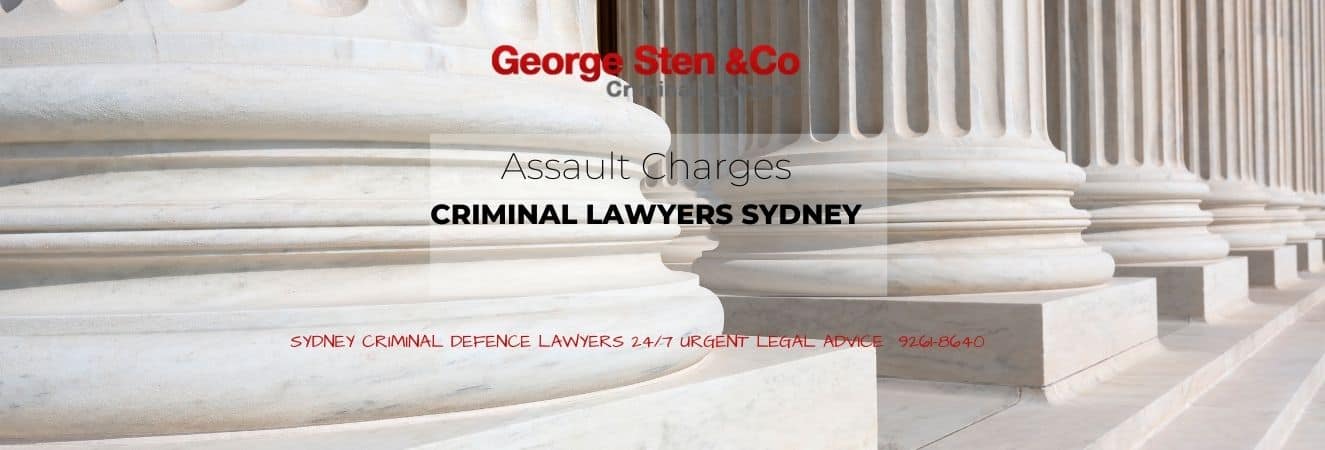- Highest Quality Legal Defence
- 0412 423 569
- 24 hr service
- (02) 9261 8640 緊急案件!Urgent Call
- Make Booking
Assault Lawyers Campbelltown

Assault Lawyers Campbelltown| Campbelltown Court Representation
Assault Lawyers Campbelltown -Expert Lawyers in Assault Charges!
Assault Lawyers Campbelltown. Assault charges are a extremely serious offence, if you have been charged with assault, you need to contact our Campbelltown Assault Defence Lawyers at George Sten & Co for legal advice. Engaging an experienced assault lawyer can make or break your case and here at George Sten & Co, we have over 50 years experience in criminal law.
Between March 2017 and March 2018 there were 1528 incidents of assault in Campbelltown. Assault is a very serious criminal charge and a person convicted of assault may face years in prison, depending on the particular charge and seriousness of the offence. If you are found guilty of an assault charge, you may lose your job and have your future employment prospects reduced. Certain countries will also not allow persons to enter if you have a criminal record. The United States for example does not allow anyone to enter who has “any convictions, un-adjudicated arrests, or even a previously refused visa”.
There are 20 different assault offences under the Crimes Act 1900 (NSW) with some of the most frequently prosecuted including Common assault, Assault occasioning actual bodily harm, Sexual assault and Indecent assault.
If you have been charged with any assault offence, it is essential to retain an expert criminal defence lawyer who is able to ensure your matter is properly defended in court.

Depending on the assault offence a person has been charged with, the facts of the particular matter and the strength of the police case will determine how an accused person should respond or plead to being charged with an assault offence.
Assault Lawyers Campbelltown | We Fight For Your Rights
The police must prove that the person charged with assault acted in a way which caused another person to fear immediate and unlawful personal violence or that the accused person touched another person without their consent. The police must also prove that the alleged victim did not consent to the accused person’s actions and that the accused acted either intentionally or recklessly. If the accused person raises a defence such as self-defence, the police must prove that the accused did not have a lawful excuse for the alleged assault.
The violence which is alleged to have been feared by the victim must be immediate and unlawful. This means that where the violence is not feared to be about to occur, there will be no assault. For example, if a person fears that in 24 hours time, or in a week, or in a year that violence may occur to them by another, no assault can have occurred as the violence is not immediate.
There are countless acts which may constitute an assault. Examples include raising your voice at another person which causes them to fear immediate violence, or doing a physical act which has the same result, such as raising a fist at another, pulling out a knife or anything that may be used as a weapon. It is not necessary for there to be any actual touching or physical contact for an assault charge to be proved. By simply causing another person to fear immediate violence, an assault may have occurred.
If the police can prove there was physical contact involved in the assault, this may increase the seriousness of the offence. Battery is the term used to describe the actual infliction of unlawful force on another person.
If you are found guilty of assault, the court may impose a range of penalties including but not limited to a Section 10, a fine, a good behaviour bond, a community service order, a suspended sentence or full-time imprisonment.
An expert criminal defence lawyer is able to analyse the facts of your particular case, apply the law accurately and ensure the best outcome is achieved in the circumstances. It is essential to retain expert defence to ensure your case is properly defended.
In prosecuting a person charged with assault, the police will generally try to convince the magistrate or judge that a heavier available penalty should be imposed. An expert criminal defence lawyer will be able to identify reasons as to why this should not be the case.
If you are found guilty of assault, it may be possible to convince the court that a Section 10 is appropriate. This refers to a process by which a court does not record a criminal conviction against a person who is found guilty of a crime. If you receive a section 10, you will be able to legally say that you do not have a criminal record – for example when applying for a job or when travelling overseas.
If you have been charged with assault in the Campbelltown area you will most likely have to appear in the Campbelltown local court. Common assault matters are generally heard in the Local Court in front of a magistrate. If the charge is more serious however, the police may request for the matter to be heard in the District Court. If the matter is heard in the District Court, this will be in front of a judge and the judge will be able to impose a heavier penalty if you are found guilty. Call our Assault Lawyers Campbelltown today for expert advice 02 9261 8640

